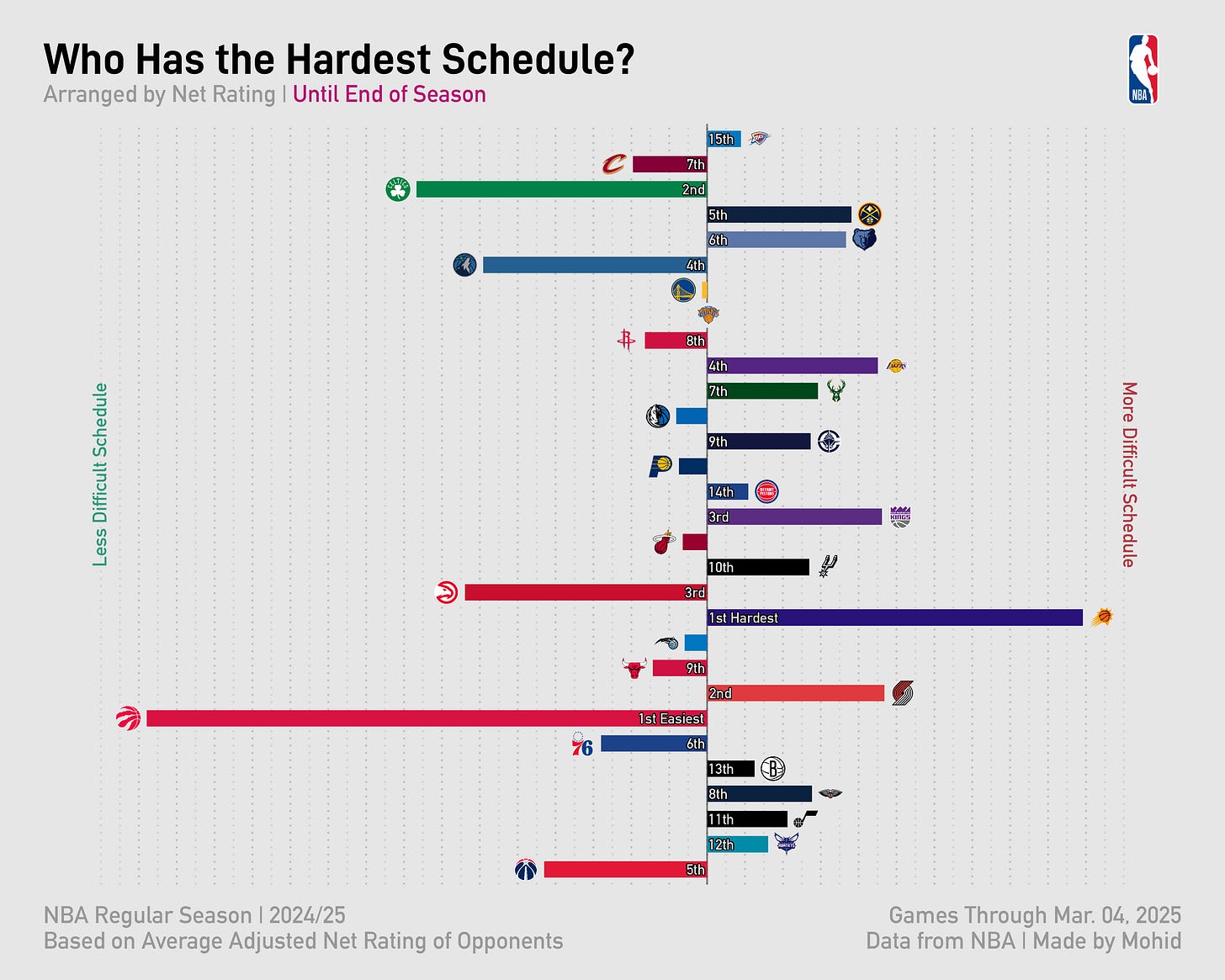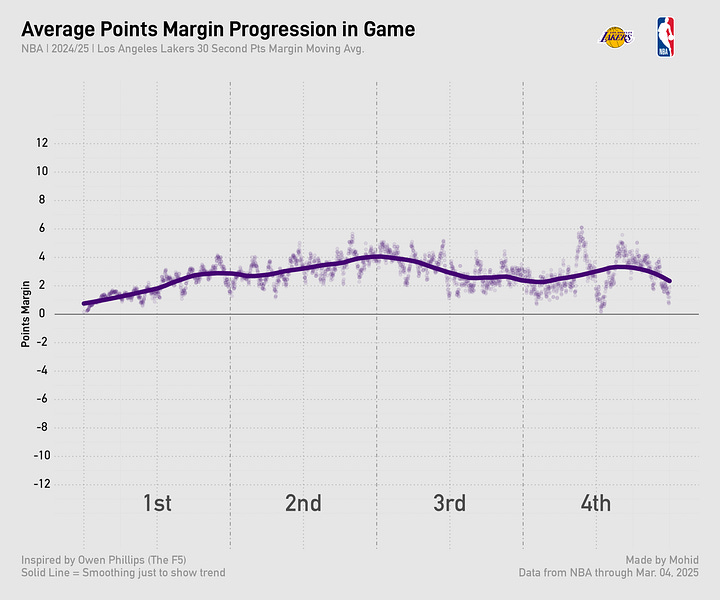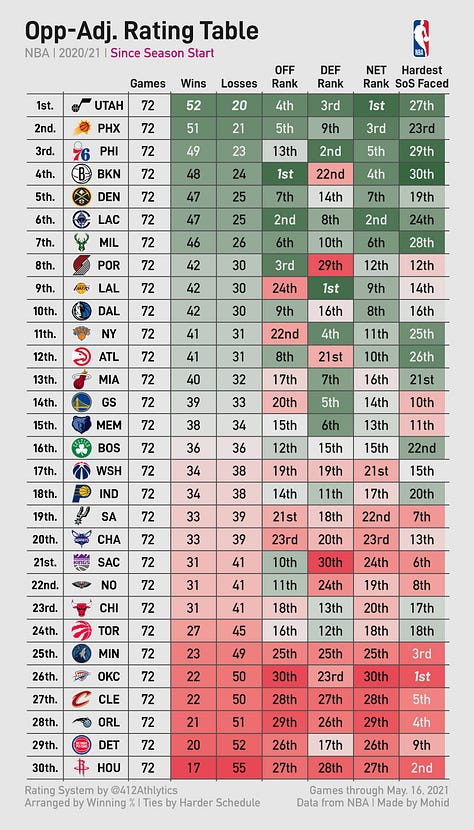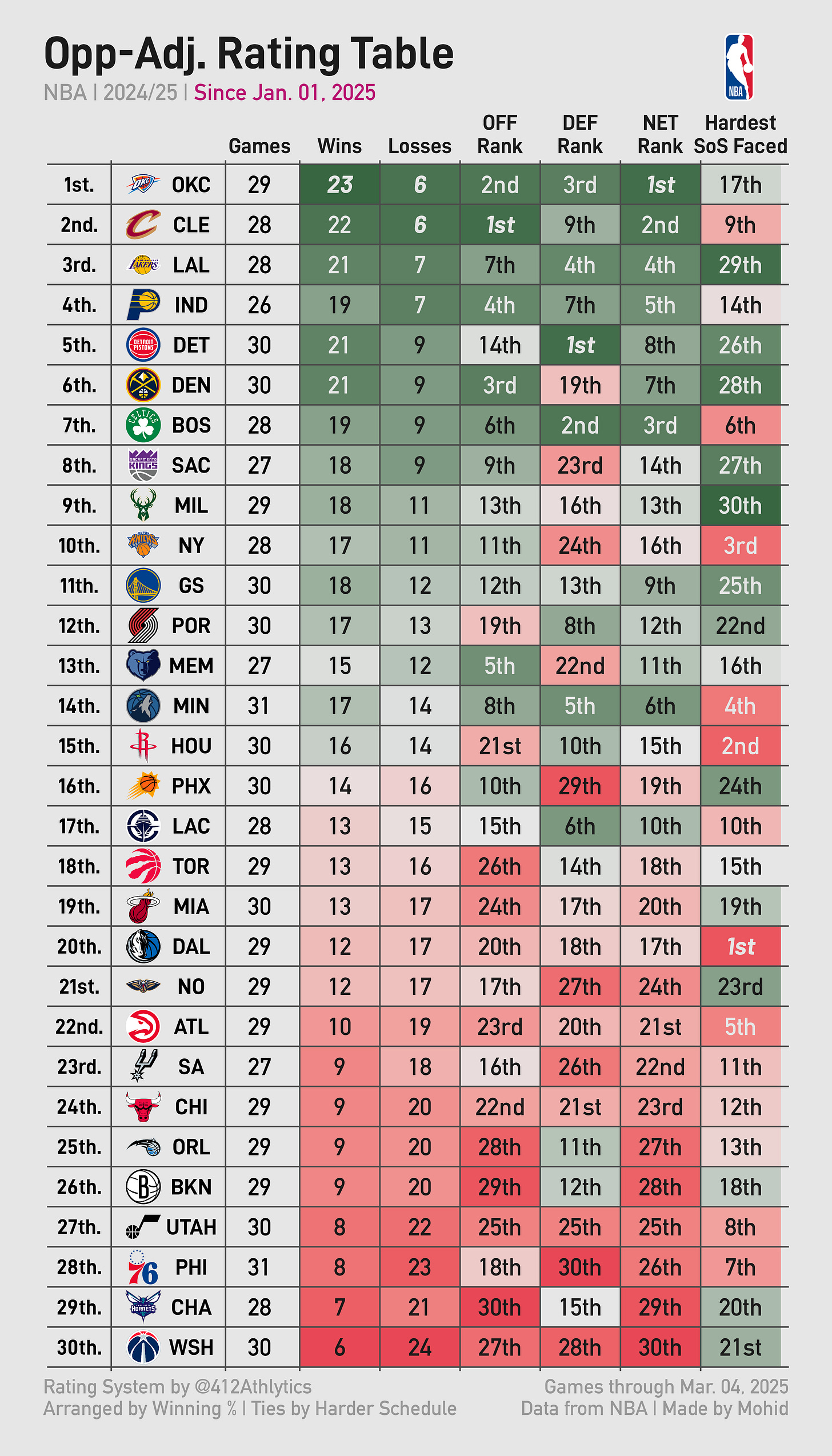Examining the 2024/25 Houston Rockets
As a former lottery team comes good (perhaps) a couple years early, let's take a look at what makes the Rockets actually a decent basketball team
All data is correct through the games on March 4th, 2025.
At the time of writing this, the Houston Rockets are 37-25 after a 12-point loss to the Indiana Pacers and are 3 games ahead of the 7th seed. While they might be on a 3-game losing streak, this is a far cry from the .500 record they finished last season with and there are several factors contributing to their rising success.
The Rockets have the fifth best record against top 10 OA1 Net Rating teams at 13-11 (CLE 14-5, OKC 14-7, BOS 11-7, LAL 10-8, are first to fourth) and are the only team this season to beat each of Boston, Cleveland, and Oklahoma City. They’ve played the 4th most clutch-time2 minutes (140) of any team in the league yet have the 12th worst net rating (-6.1 Pts/100 Poss.) in the clutch. Nevertheless, their OA Net Rating overall ranks them at 9th best with a 19th best OA Offensive Rating and a 2nd best OA Defensive Rating.

So what kinda team are the Houston Rockets? Let’s find out.
Season-Long Progression
The Rockets last season reached as high as 7th in the OA Net rankings before plummeting down to finish the season at 19th. This season (below), they reached as high as 4th before dropping to 9th after their second 3+ game losing streak of the season.

Having played the 3rd hardest schedule since the start of the season, heading into the 8th easiest should mean Houston can put together a couple results and secure a playoff spot.
It’s an incredible development from their 2022/23 season when they finished with the joint-2nd worst record in the league (for the Wemby sweepstakes) and the second worst OA Net Rating in the league3 (28th for OFF and 29th for DEF, see below).

The defense is obviously what sticks out as the biggest improvement. While the offense is middle of the pack, the Rockets are slightly ahead of the Magic (and very far from the top-dog OKC Thunder) in the race for a top-2 league-wide defense.
Defense Wins Games
Houston’s defensive prowess is rooted in their ability to play the perimeter game. Besides having Amen Thompson’s incredible athleticism to guard top scorers one-on-one, Ime Udoka’s set up also leans towards using the whole team to defend. Playing with Şengün as the anchor, the Rockets hound players off the three-point line. This can be seen in the data:

The Rockets are more than willing to give up a shot inside the arc if it means the value of the shot attempt decreases. They’re also a fantastic rebounding team. They rank 9th in contested defensive rebounding % and have the best offensive rebounding % in the league:
We’ll get back to the offensive rebounding later but as a team, the Rockets are more than willing to play physical on defense to put opponents off their rhythm. And the thing is, when push comes to shove, the Rockets can grind out games. In fact, they have the smallest median margin of game in the league:
Nevertheless, seeing how Houston’s clutch Net Rating is so bad, this could be because they bring in big leads to the 4th quarter and squander them. I looked into how their average (non-absolute) margin of game looks over the course of a game (not including overtime):





The strangest thing is, in the data, even the teams in the top 5 for clutch-time net rating exhibit this same downtick in margin of game. Cleveland makes sense as they bring in such a large lead that most of those late-game minutes are garbage time, but for a team like the Knicks who are 10th for clutch minutes played, that downturn in margin is sizable.
Perhaps this is a great example of the rubber-band effect.
Offensive Struggles
While they may have a top-2 defense in the NBA, Houston’s offense falls in the middle of the pack, nearly verging on the bottom-10.
The issue with Houston’s offense comes down to how archaic it is. There are no noticeably talented shooters on the team. The only starter who is above average from behind the arc is Dillon Brooks, and that’s not the guy as the face of your 3-point squadron.
The Rockets just don’t take that many threes and it’s a problem that could be heavily exploited come playoff time. Besides that, the Rockets just aren’t that good at putting the ball in the basket from anywhere:
There is some silver-lining in this, however. Remember the offensive rebounding excellence mentioned above? The Rockets get the most 2nd chance points per 100 possessions (17.9) of anyone in the NBA, a whole 1.2 Pts/100 Poss. more than second (CHA). While the Rockets might suck at shooting, they are aware of it and make sure to get under the basket to increase their likelihood of scoring on a given play.
Another way Houston loves to get points is by inflicting intense suffering on the opposition. After being hounded for 24 seconds of the shot clock by Tari Eason and Amen Thompson, you have to sprint down to your basket to avoid letting the Rockets score on the fast break, as they have the 3rd most points of fast breaks per 100 possessions.
Nevertheless, the shooting does get worse. The Rockets make more free throws than their opponents in less than half of their games:
However, they attempt more free throws than their opponents in 60% of games, coming in just behind MIA (65%), LAL (62%), and DEN (61%) in that stat. At 74.3%, they have the worst FT% in the NBA.
Some of the offensive flaccidness can be blamed a bit on the Rockets lacking a big roll threat in the pick & roll. Şengün has played nearly entirely at center this season but he seems more like a power forward in reality and the Rockets suffer because of it. The Rockets have the 2nd lowest points per possession from the roll man in the pick & roll. Yet that’s not to say Şengün is just a negative. The Rockets get the 3rd most points per possession from post ups and he is a big contributor to that.
If you want to see some other places where the Rockets struggle (think anything to do with off-ball movement or shooting), you can look through the NBA stats website here.
Expectations
With the Houston Rockets, time is in plentiful supply. The Rockets did not expect to be good so early in the rebuild. Ever since Harden left, the focus has been on re-establishing a philosophy, and with the hire of Udoka, that philosophy seems centered around committing to playing rugged defense with a (very) youthful core.
They have the 5th youngest team when weighted by minutes played, behind 4 rebuilders in WSH, UTAH, POR, and TOR (MEM and OKC are 6th and 7th, respectively, by the way). There’s a whole lot of upside for this team and some playoff experience will go a long way towards gearing them for a final fight.
The success of the Houston Rockets and the OKC Thunder as strong defensive squads with youthful upside could be signaling a shift in team-building focus. As the value of the 3 drops relative to the 2, teams might shift their chips towards harboring a commanding defense rather than a high-volume shooting offense.
The Pacers last year had the 2nd-best OA Offense but the 24th best defense from the regular season as they faced the Celtics (1st Off., 3rd Def.) in the Eastern Conference Finals. They got blown out. That high-octane, trigger-happy style fell flat in the face of honest defense. Yet the same style could be attributed to the Celtics, who this year are the first team since the Morey Rockets to have a higher 3PA Rate than 2PA Rate. They combine defense with offense to win games (something OKC does, as well, especially since the new year, see below).
If we look over the past five years, we can see that teams in the top 5 for regular season OA Offensive Rating have won 26 playoff series and teams in the top 5 for defense have won 31 (this double counts teams in the top 5 for both such as last two years Boston along with the 21/22 Suns, 20/21 Jazz, and 19/20 Clippers). So perhaps starting from a strong defense and building towards an offense might help the Rockets have a more stable and wider championship window.





Predicting the future of the sport is wildly difficult. Team building, matchups, rule changes, player emergences—they all contribute to making the NBA impossible to model. Mostly, however, teams that are both good offenses and good defenses are more likely to win stuff. To be among that pack, Houston needs to shore up its frontline.
Maybe that means Devin Booker needs to land in Space City sometime soon.
I need to provide the obvious disclaimer that any non-mainstream stats you’ve seen on this post are made by me and could be in error. If you have any questions, leave a comment and let me know what you think. Thanks!
Opponent-Adjusted
Last 5 minutes of the game with the score within 5 points.
Only regular season.
















